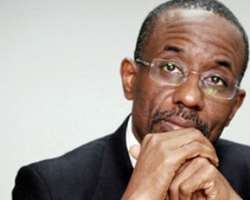FG may review acquisition of Bank PHB, Oceanic, four others

Again, the tenure of the former Central Bank governor, Sanusi Lamido Sanusi, may be facing another scrutiny as there are strong indications that the Federal Government may review the takeover of six banks by the apex bank in 2009.
This time around, the government action is being prompted by the two Bretoon Woods institutions, World Bank and International Monetary Fund (IMF), which reports indicate have called for such a review.
According to reports, they have asked the government to review the policy guidelines used by the former Governor of Central Bank of Nigeria (CBN), Sanusi Lamido Sanusi, in executing the takeover of six deposit money banks in 2009.
There have been a lot petitions and allegations of all sorts against the action of the CBN on the six banks, with some shareholders exploring various options wichincluded court action, but none had received the backing of the Bretton Woods duo.
A report in the Sun quotes Presidency source sa saying that the two development finance institutions in a letter to President Goodluck Jonathan and signed by Christine Lagarde of IMF and Dr. Jim Yong Kim, of World Bank respectively, had requested for a review of the process.
The CBN in the first few months of Sanusi's tenure, annmounced the CBN takeover of Bank PHB Plc, Afribank Plc, Spring Bank Plc, Union Bank of Nigeria, Intercontinental Bank Plc, and Oceanic Bank Plc.
There were reports of hidden agenda by the former CBN governor, but that did not stop Sanusi who went ahead to intiate far-reaching policies on the banks and the baking sector in general.
According to the reports, the joint letter stated that it had earlier received a complaint to this effect by the shareholders of banks in Nigeria. “It would therefore be appropriate for a review of the processes adopted by Central Bank of Nigeria during the acquisition of the affected banks.”
President Jonathan is said to be considering a review of the process and modalities that led to take-over of the six banks, but is inssiting that that would happen only if a prima facie case is established so that it would not look like the government was out to witch-hunt the former CBN governor, who has now become the Emir of Kano.
. “We were waiting for the appointment of a substantive CBN governor, now that has been done, the process will begin,” the source stressed.
In their letter to the World Bank and IMF, the shareholders had stated that Mallam Lamido Sanusi, Governor of CBN, intervened in 2009 in pursuit of what he termed a reform of the Nigerian banking sector to illegally take over their investment.
Part of the Nigerian shareholders letter to IMF and World Bank read:
“You are well aware that Lamido Sanusi, upon his appointment in 2009 as the Governor of Central Bank of Nigeria intervened in the banks mentioned above to remove their managing directors and executive directors and to replace them with his own appointees, which thus brought the banks under his management and control. At the end of the process, three of the banks were said to have been compulsorily taken over by the Federal Government of Nigeria through entities hurriedly created for that purpose and presented as bridge banks said to be solely promoted by the newly created government agency known as Assets Management Corporation of Nigeria (AMCON) and at absolute loss to their shareholders.
“The other banks were forced into acquisition by fellow banks and other investors on terms dictated by the CBN Governor, which were at a huge loss of the nominal value of their shares on the basis that they had negative assets, as argued by the CBN Governor and the management teams he installed in the banks. They were bullied into the deals with threats of similar nationalisation. The purpose of this letter is to draw attention to the unarguable facts and circumstances, which expose the falsehood and injustice in the “reform” measures and to present the IMF and World Bank with compelling reasons why they should prevail on the Nigerian government to review these measures and recover the investments of millions of Nigerian shareholders in the banks, which have been stolen through them.
“At the inception of his tenure in 2009, Lamido Sanusi made specific conclusions on the financial state of each of the banks, which he claimed were based upon forensic audits. He gave specific figures including the amount of capital that would be required to be injected into each bank to move them out of danger threshold. He then claimed in each case to have injected billions of naira into the bank as second-tier capital. The principal cause, which the CBN Governor claimed to have identified from his “forensic audit” of the banks of what he believed to have been their problem was erosion of capital through unacceptably high volume of non-performing loans.”
